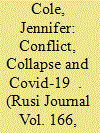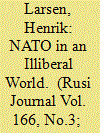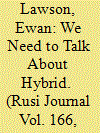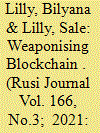| Srl | Item |
| 1 |
ID:
180509


|
|
|
|
|
| Summary/Abstract |
A recent history of internal conflict has left much of Yemen’s infrastructure and healthcare system destroyed. An already-dire situation, in which Yemeni people face daily challenges from food insecurity, lack of sanitation infrastructure, continuing conflict and regular outbreaks of infectious disease, is exacerbating the spread of Covid-19. With only half of Yemeni hospitals and medical facilities in full working condition, the country is in desperate need of medical equipment, healthcare workers and money to ensure conditions do not deteriorate further. This presents a stark picture of the challenges faced by healthcare systems degraded by conflict. Infectious disease outbreaks that cannot be contained in such contexts threaten global health security on a wider scale and must be addressed at the source.
|
|
|
|
|
|
|
|
|
|
|
|
|
|
|
|
| 2 |
ID:
180511


|
|
|
|
|
| Summary/Abstract |
The US naval services are facing a strategic imperative. The US Navy is no longer the most numerous in the world, nor does it hold the technological edge in all maritime domains; yet, measured by individual warship capability, it remains supreme. Nevertheless, that metric may be less important in the face of adversary numeric superiority and the presence of disruptive, emerging technologies. As we see a resurgence of great power competition and new technologies that can be employed to gain advantage across the spectrum of conflict, James Wirtz, Jeffrey Kline, Phillip Pournelle and Mie Augier argue that the US naval services need to capture opportunities to employ disruptive technologies and to think through how to adapt to the changing security environment.
|
|
|
|
|
|
|
|
|
|
|
|
|
|
|
|
| 3 |
ID:
180515


|
|
|
|
|
| Summary/Abstract |
Partnerships remain NATO’s only external policy instrument in an illiberal world. However, NATO needs to differentiate more clearly between its partners and intensify security cooperation with like-minded states to mitigate the threats posed by Russia and China. Henrik Larsen proposes the following differentiation: ‘Advanced Partners’ in Western Europe and the EU, stressing the benefits of their technological strengths and shared values to bolster joint resilience capacity; ‘Enhanced Partners’ in the Western Balkans and Eastern Europe, focusing on the need to improve governance and resilience vis-à-vis illiberal powers; and ‘Worldwide Partners’, prioritising both NATO’s southern periphery, to manage regional instability, and the Asia-Pacific, to counter threats posed by the rise of China. Partnership reform should accompany a reflection about the role of resilience in NATO’s security and defence portfolio.
|
|
|
|
|
|
|
|
|
|
|
|
|
|
|
|
| 4 |
ID:
180514


|
|
|
|
|
| Summary/Abstract |
Deception has always been a valid stratagem of war. However, a number of important issues influence how deception could be used, or negated, within contemporary and future warfare. In this article, Neil Verrall clarifies the conceptual understanding of deception and recent developments within it, and highlights ongoing and new challenges. The article concludes by asking whether deception is still possible, or even desirable, in the 21stcentury.
|
|
|
|
|
|
|
|
|
|
|
|
|
|
|
|
| 5 |
ID:
180510


|
|
|
|
|
| Summary/Abstract |
The fairly recent development of remote sensing for human rights purposes has raised expectations due to its specialised capabilities and power to overcome some technical and physical limitations related to fieldwork. In this article, Cono Giardullo draws on case studies related to the OSCE’s Special Monitoring Mission in eastern Ukraine and its extensive drone usage over six years to show how surveillance drone technology has the potential to improve the monitoring and reporting of human rights and humanitarian law violations in armed conflict scenarios.
|
|
|
|
|
|
|
|
|
|
|
|
|
|
|
|
| 6 |
ID:
180513


|
|
|
|
|
| Summary/Abstract |
Hybrid warfare has been an important topic in much of Western national security discourse in the past five years, albeit with many different labels. The concept is problematic in that it can be applied to a range of activities that, while coercive, might have been considered part of routine statecraft and has been applied to a range of contexts where the actual activities being described are quite different. In this article, Ewan Lawson discusses how the concept of hybrid warfare is important for policymakers as it reinforces the idea that conflict and competition should not be seen through a simple peace–war dichotomy. It also highlights the importance of a whole-of-government response and the risk of seeing it through a purely military prism.
|
|
|
|
|
|
|
|
|
|
|
|
|
|
|
|
| 7 |
ID:
180512


|
|
|
|
|
| Summary/Abstract |
This article presents the first open source assessment of how the US, Chinese and Russian militaries discuss the application of blockchain technologies in warfare. Bilyana Lilly and Sale Lilly examine mentions of blockchain in the official military publications of each country – in their respective native languages – to identify the similarities and differences in each military’s blockchain outlook, ranging from mitigating cyber security vulnerabilities to supply chain management and battlefield logistics management. They conclude by offering several policy implications and observations for defence planners.
|
|
|
|
|
|
|
|
|
|
|
|
|
|
|
|